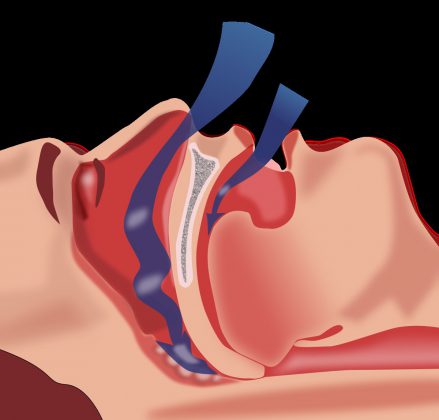There are a few health conditions that affect you when you’re trying to get some shuteye. One of these is Sleep Apnea.
Sleep Apnea affects approximately 18 million Americans or one in every five adults. However, only 20% of those suffering from the condition have received a diagnosis and are getting treatment for it.
Sleep apnea affects people of all ages. Since it is hardly diagnosed and treated, research must be done regarding it so that it improves the quality of your life.
Let’s talk about sleep apnea in detail.
What Is Sleep Apnea?
Sleep apnea is a sleep disorder that deteriorates the quality of your sleep. During sleep, your breathing may be interrupted repeatedly. According to Mayo Clinic, if someone snores loudly and feels tired after a full night’s sleep, they may have sleep apnea.
Sleep Apnea is categorized into two types: Obstructive sleep apnea, and central sleep apnea.
Obstructive Sleep Apnea: This is the most common of the other type, and occurs when the throat muscles relax.
Central Sleep Apnea: this occurs when the brain doesn’t send appropriate signals to the muscles that control breathing.
Causes Of Sleep Apnea
As mentioned above, obstructive sleep apnea takes place when your throat muscles relax excessively. When there is excessive relaxation, normal breathing gets hindered. As a result, your brain jolts you awake from your sleep so that you may breathe properly again. Quite interestingly, these brief jolts of waking up in between are so quick at times that you may not even realize they’re taking place!
Sleep apnea can take place due to various aspects involving physical, lifestyle, and genes. You may have increased risk of sleep apnea if:
- Are male
- Are overweight
- Have a large neck (17 inches or more for men, and 16 inches or more for women)
- Have particular physical features, including large tonsils, a small jawbone, or a large tongue.
- Are 40 years of age or older
- Have a family history of the condition
- Are suffering from nasal obstruction, such as sinus problems, allergies, or a deviated septum.
It is important that you discuss with your doctor regarding your individual risk for sleep apnea, and if it may be happening because of your current health status or family history.
Symptoms Of Sleep Apnea
Image source: WebMD
Because so many people don’t identify the symptoms of sleep apnea, it goes unnoticed and untreated. Many people dismiss the symptoms because they often resemble simple frustrations of daily life, such as poor quality of sleep, feeling tired during the day, etc. Moreover, the symptoms of sleep apnea may also resemble the symptoms of other medical conditions, which makes it even more difficult to diagnose.
The symptoms of sleep apnea may be subtle enough for you to dismiss them completely. However, in case you’re experiencing any of these symptoms, you may be suffering from sleep apnea:
- Feeling extremely sleepy and tired during the day.
- Loud snoring during sleep
- Waking up from interrupted breathing during sleep
- Waking up with a jolt while gasping or choking
- Getting headaches in the morning
- Waking up with a sore throat or dry mouth
- Mood swings, including irritability or depression
- High blood pressure
- Sweating excessively at night
- Decreased libido
There are certain symptoms that are more serious than others. For instance, if you’re snoring very loudly, and disturbing others’ as well as your own sleep, it is better to see a doctor. Moreover, if you wake up in the middle of the night gasping for air, please get in touch with a doctor as soon as you can. It is also crucial to seek medical assistance if you keep falling asleep during the day or experience hindered breathing at night.
How To Diagnose Sleep Apnea
When you visit your doctor for sleep apnea, they may be able to point out the causes of the condition. Sleep apnea may be diagnosed through various examinations and tests.
In this regard, your doctor will first perform a physical exam. It would be better for you if you share any symptoms you’re experiencing. You may also get a close examination of your neck and head.
From there, your doctor may suggest any of these tests:
- A Polysomnogram—sleep study performed overnight in the hospital to see how you function during sleep.
- EEG—monitoring of brain waves before, during, and after sleep.
- EOM—recording eye movements
- EMG—tracking of muscles as they move and relax
- EKG—monitoring of the heart
- Pulse Oximetry—testing of oxygen levels in the body
- Blood tests to check the oxygen content, pressure, and saturation in your blood
Your doctor may perform one of these tests, or a combination of them to find out if you have sleep apnea or not. Through the insights from the tests, your doctor may be able to make an official diagnosis and discuss treatment plans with you.
Treatment Of Sleep Apnea
Image source: Healthline
When you’re diagnosed with sleep apnea, your doctor may suggest treatment options that are best for you.
It would be better for you to follow the guidelines for the treatment of sleep apnea. The condition may worsen if left untreated for long and may result in other symptoms as well, such as stroke, heart failure, high blood pressure, diabetes, etc. It may even result in accidents in case you’re falling asleep during the day.
Your treatment for sleep apnea may be done in various ways according to what’s causing your symptoms and their seriousness.
Sleep apnea may also be treated with simple lifestyle changes at times. Avoiding alcohol, smoking, maintaining a healthy weight, and changing your sleeping position may help too.
Other treatment options may include:
- Continuous Positive Airway Pressure (CPAP) Therapy
This involves wearing a mask to keep your airways open while you’re asleep.
- Surgery to remove tonsils or tissues, or to shrink or stiffen them.
- Wearing A Mandibular Repositioning Device (MRD)
An MRD is a custom-made oral device that helps keep the jaw in a forward position to make more space for air.
Conclusion
In this article, we discussed Sleep Apnea–a condition that disrupts sleep.
While discussing the symptoms, causes, and diagnosis of the condition, we also discussed the treatment options.
With treatment, you will be able to improve the quality of your sleep and your health. Therefore, to improve your sleep apnea condition, it is crucial that you follow your doctor’s advice and stick to your treatment regimen.



